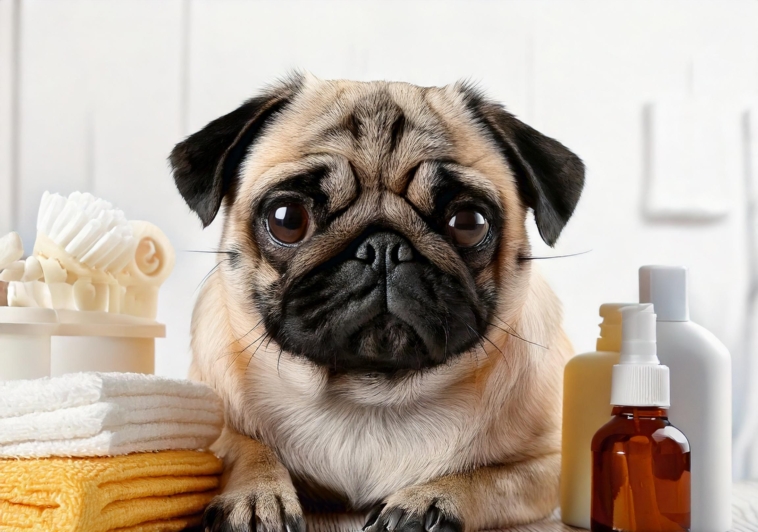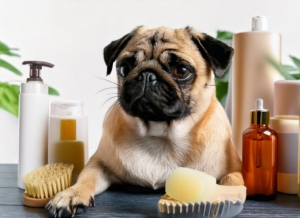Introduction: Hypoallergenic Products for Your Pug
Let’s face it — your pug may be cute enough to break the internet, but they’re also walking sneeze magnets if you’re not careful. Hypoallergenic products are your golden ticket to keeping your snorty sidekick itch-free and looking fabulous.
Here’s the scoop: Hypoallergenic pug products are basically the drama-free friends in your pug’s skincare and diet crew. They skip out on the usual allergy suspects and keep things chill.
- Food: No soy, no wheat, no dairy—essentially none of the good stuff we adore, but, hey, your pug’s stomach will appreciate it.
- Shampoos: Imagine spa-level treatment but minus the perfumey frills. No dyes, no flair.
- Bedding: Tight-weave textiles – because your pug deserves high-thread-count indulgence and zero dust mites.
- Treats: If it doesn’t sound like it was plucked directly from nature’s kitchen, forget it. 100% natural only. No secret ingredients that sound like the answer to a chemistry exam.
Hypoallergenic = Happy Pug = Happy You. Win-win.
Pug-Specific Allergy Woes (And Their Petty Enemies)
Pugs have more allergens than a soap opera actress has villains. Look, the typical culprits:
- Food Allergens: Beef, chicken, dairy, wheat—i.e., your pug’s equivalent of fast food remorse. Symptoms: scratching, digestive problems, and flair-raising ear flaps.
- Environmental Allergens: Dust, pollen, mold – i.e., pretty much anything that occurs naturally.
- Contact Allergens: Cleaning supplies, shady fabrics, and any shampoo that has the scent of a tropical drink.
The answer? Get your vet to be a detective and have allergy tests done. Then remove the suspects like the boss pet parent that you are.
Recommended Best Foods for Pugs (AKA: What Won’t Turn Them Into Itchy Gremlins)
Is your pug a picky eater and life-allergic? Welcome to the club. Here’s your 2024 allergy-safe grocery list:
Weird But Wonderful Proteins:
- Goose (fancy!)
- Trout (bougie fish)
- Antelope (for the pug who wants to feel wild)
Grain-Free Goodness:
- Cassava roots (sounds tropical, tastes boring—perfection!)
- Peas (yes, those bland legumes)
- Soybeans (if your pug is okay with it)
Bonus Points:
- Less ingredients = less opportunities for itchiness
- Add omega oils for shiny coats and less itches
- Enzymes to aid in digestion of whatever strange stuff they pilfer off the floor
Avoid Like the Plague:
- Barley, flour, pulses, cream, and poultry – these are the culprits in your pug’s telenovela.
- Always refer to the pug whisperer (otherwise known as vet) before changing things around.
The Shampoo Saga: Scrub-a-Dub Without the Itch
Bath time need not be a foamy catastrophe. When selecting a hypoallergenic shampoo for your pug, consider: gentle enough for royalty, strong enough for pug stench.
- No Harsh Stuff: Adios to you, parabens are off the table, sulfates are a no-go, and anything that sounds like a chemistry experiment is a hard pass.
- Natural MVPs: Oatmeal, aloe vera, chamomile – your pug deserves a floral spa day.
- Fragrance-Free: No cucumber-melon combination here, sorry.
- pH Balanced: Same as hiring a yoga teacher for your pug’s skin.
- Vet-Approved: Consult your vet first before you create bubble trouble out of bath time.
Pug-Approved Hypoallergenic Bedding (Because Even Divas Need Sleep)
Your pug’s sleep setup should be five-star hotel level – minus the mini bar. Look for materials so cozy, even you’ll be jealous.
Mattress Protectors:
- Waterproof, allergen-proof, drama-proof
- Breathable because pugs like to sprawl
Sheets & Pillowcases:
- Tightly woven fabrics—no bug parties here
- Bamboo and organic cotton are the MVPs
Blankets & Comforters:
- Go for faux-down if your pug is allergic to. well, feathers
- Wash often, because pugs and cleanliness are not naturally compatible
Treats That Won’t Make Your Pug a Scratchy Goblin
If your pug consumes it, ensure it won’t make them a scratching maniac.
- One-Ingredient Wonders: Sweet potato, salmon, duck. Essentially the farmers market of snacks.
- Organic or Bust: If it lacks an organic sticker, throw it back.
- Flavor Bombs: Pumpkin, peanut butter (hypoallergenic variety), or dehydrated liver – chef’s kiss.
- Texture Games: Crunchy? Chewy? Let your pug choose. They’re food snobs anyway.
Healthy can be delicious — even if your pug behaves as if they’re Gordon Ramsay.
Cleaning Products That Won’t Start a Sneezing Symphony
We adore a tidy home, but not at the expense of pug sneezes. Here’s how to make your home smell good without chemical warfare:
- Plant-Based Cleaners: Since your pug needs lemon and eucalyptus, not bleach and remorse.
- Hypoallergenic Label Check: If it doesn’t boast about being hypoallergenic, chances are it isn’t.
- Eco-Friendly Brands: Save the planet. Save the pug. Be a legend.
- Avoid Ammonia and Bleach: They’re essentially villain backstories in a bottle.
Grooming Tools That Say “No” to Allergies and “Yes” to Fabulous
Who says beauty must be painful? Stay chic, safe, and sneeze-free with these:
- Soft-Bristle Brushes: For Beyoncé-level fur flips sans the rash.
- Allergy-Free Combs: Stainless steel = fewer breakouts + more sparkle
- Hypoallergenic Shampoos: Keep them fresh-smelling and flake-free.
- Towels That Don’t Rub Wrong: Pug-friendly materials that are as soft as their snore.
Final Checklist: Keepin’ It Healthy, Keepin’ It Puggin’
You wish to have your pug live their best snuggly, zoomie life? Then obey the golden rules:
- Grooming: Brush frequently, bathe gently, and for goodness’ sake, never let them get close to your shampoo.
- Diet: Feed them something that won’t have them blowing up in a later itch attack.
- Exercise: A short jog, plenty of snorts. Keep it regular.
- Environment: Clean room, clean air, clean sheets – a pug palace.
- Vet Visits: Every two months, even if your pug gives you the stink eye about it.
Conclusion:
Pugs are royalty wrapped in wrinkly packages. Keep them itch-free, allergy-safe, and pampered to perfection with hypoallergenic care. Because when your pug’s not scratching, everyone’s happy – especially your furniture.





